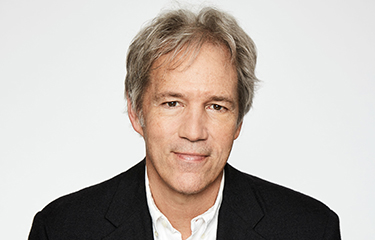Fishing for wild salmon in British Columbia is what inspired famed Hollywood television writer and producer David E. Kelley to enter the aquaculture industry six years ago.
At the Aquarium of the Pacific in Long Beach, California on 16 October, Kelley – who is the producer of TV shows such “Big Little Lies” and “Ally McBeal” – explained how he became founder and chairman of Riverence, a sustainable steelhead trout farming operation in Filer, Idaho, as well as a salmon and trout egg producer in Olympia, Washington.
“I really got into it [the aquaculture industry] as a fisherman,” Kelley told the audience at the Aquarium of the Pacific. “I was fishing in British Columbia and fell in love with the salmon. It really is a miracle fish. I think everyone knows the story of it: it’s a fish that grows in the river and swims to the ocean, and then brings all these nutrients back to the river, which feeds hundreds of species on land.”
“I’ve often thought, ‘As the salmon goes, so will we,’” Kelley said. “The idea that they might be threatened is how I got into it [aquaculture]. The population is headed toward 10 billion in 2050, and the consumption of salmonids is going up and up and up. Something has got to give and it’s going to be salmon, unless we can come up with an alternative protein source.”
While Kelley originally knew “nothing” about animal husbandry, his friend was experienced, and they both began researching various ventures.
“We came to the conclusion that aquaculture was a worthy and needed venture,” he said.
In his early research, Kelley discovered that genetics were paramount to the success of producing quality fish. So, he decided to acquire a broodstock farm in Washington state foremost, and then “really drilled down on the genetics, breeding fish that could thrive in our grow-out systems,” he explained. Next, Kelley acquired farms in Idaho for grow-out. Riverence now operates eight farms in Idaho, and produces between eight and nine million pounds of steelhead trout annually.
While Riverence is partially a philanthropic endeavor on his part, Kelley said the producer, which supplies to retailers and restaurants across the United States, is out to make a profit.
“That is important because the only way aquaculture is going to grow…is if we establish proof of concept that you can make money doing so. Making a profit is core to our mission,” he said.
And Riverence is “almost” profitable, Kelley added.
“We started out cash flow positive, but we made a number of improvements to build for the future. We have brought on a formidable science team, and a director of sustainability. We have got the building blocks for the long term haul in this industry,” he noted.
However, the biggest challenge Riverence faces is building the market for its premium fish, Kelley said.
“We have invested in nutrition and lower densities. We have put a lot of effort into making our fish a premium product and the goal is to common a premium price. The biggest challenge is when distributors and customers say they want aquaculture to do it a better way, but don’t want to necessarily pay 10 cents more for it,” he explained.
Some distributors such as Santa Monica Seafood in Santa Monica, California, care about sustainable fisheries and have greatly supported Riverence, Kelley said.
“When we can latch onto retailers and distributors who care, that makes our job easier,” he said.
Fish feed is Riverence’s biggest expense, according to Kelley.
“To do it better, it costs more, especially if you want to get away from fishmeal and fish oil and go to alternatives,” he noted. The Riverence’s team is exploring fishmeal and oil alternatives, he said.
The water Riverence uses for its operations is recirculated back into the earth, Kelley said.
“One of the reasons we chose Idaho and the Snake River is that it is very pure water at a constant temperature that allows our fish to flourish,” he said. “You can’t find good water everywhere, and it is one of the biggest challenges for us as we look to expand.”
While Kelley hasn’t applied his storytelling expertise to aquaculture yet, he has a desire to do so.
“I tell my wife about it once a week: ‘What about a series on fish farming?’” he said.
Photo courtesy of David E. Kelley







